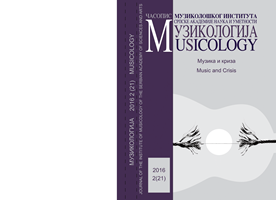Усуд постмодерног света: о Меланхолији и Револту Милана Михајловића
The Fate Of The Postmodern World: On Melancholy And Rebellion By Milan Mihajlović
Author(s): Ivana VuksanovićSubject(s): Music, Aesthetics, Sociology of Art
Published by: Muzikološki institut SANU
Keywords: Milan Mihajlović; melancholy; citability; circle concept; postmodern;
Summary/Abstract: The musical оеuvre of Milan Mihajlović (b. 1945) enjoys a high reputation and position in contemporary Serbian music. This has been proven by the many awards he has received, countless performances of his compositions at home and abroad, and especially by the warm and approving reactions of the audience. The stylistic consistency in his oeuvre is a result of his creative use of Scriabin’s scale. The concept of this scale was first theoretically elaborated in an extensive study written by Mihajlović in 1980 and, since then the scale has been functioning as a crucial cohesive element in all Mihajlović’s compositions. The novelty in his oeuvre, composed during the 1990s, were intertextual references made by using citations from his own works and those of other composers (Monteverdi, Mozart, Stravinsky, Rachmaninov, Vasilije Mokranjac). The most characteristic features of his mature style are also recognizable in his recent works Melancholy (2014) and Rebellion (2015). The interval structure of Skriabin’s scale is projected along the horizontal (melodical) and vertical (harmonical) axes of the both works while the formal design resulted from shifts of tensions and relaxations. Developmental sections are based on variation and improvisation of the small number of different motifs (three basic ones in Melancholy, four in Rebellion) above the metrically moveable ostinato layers and the releases are marked by change of tempo, dynamic, meter and texture. The most significant and radical release is the one which marks the abrupt ending of Rebellion by the physical gesture of slamming down the keyboard lid. As the composition was written for the BUNT festival (Belgrade) it fits the festival’s idea of expressing resistance to the government’s neglect of academic musicians and institutions. In the wider sense, it becomes a sign of the resistance to the world we live in, and that is the world of lost ideals. Both works are composed for the wind instrument and the piano quartet and in the both cases the author’s voice, with its figures of sorrow and anger, is personified in singing, narrative lines of the wind instrument (the oboe in Melancholy and French horn in Rebellion respectively). These two compositions also demonstrate the specific concept of a circle that is intuitively searched for and ingeniously implemented. It is manifested by the cyclic concept of Scriabin’s scale and projected in all of the author’s compositional procedures as a vehicle for the expression of lament and resignation.
Journal: Muzikologija
- Issue Year: 2/2016
- Issue No: 21
- Page Range: 88-108
- Page Count: 21
- Language: Serbian

